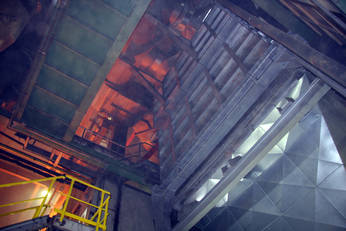Article also available in <link external-link-new-window>![]()
<link file:7203 download> | |
| Schematic representation of the waste heat recovery |
The Maggi plant in Singen generates saturated steam for its production facilities from the waste heat of the GF Automotive cupola furnace. This reduces CO2 emissions into the environment by over 11,000 tonnes a year. In the presence of numerous guests from the world of politics and industry, Germany's Minister for the Environment Sigmar Gabriel officially inaugurated the installation on 22 January 2009. Georg Fischer receives compensation for the heat it supplies, and the food factory of Nestlé Deutschland AG uses this heat to meet up to two thirds of its natural gas requirements. The investments – Georg Fischer spent 3.5 million euros and Maggi 1.5 million – will be amortised within a few years, and emissions into the environment will be reduced by as much as 11,000 tonnes of carbon dioxide annually. Moreover, the Federal Ministry for the Environment, Nature Conservation and Nuclear Safety in Berlin has contributed 20 percent of the investment costs to support the project.
Georg Fischer sources the waste heat from the exhaust gases of its cupola furnace. By means of a so-called recuperator (heat exchanger), the company has for years used part of the furnace's waste heat for internal processes, for instance for heating the building or the water in the boiler. The present recuperator, which Georg Fischer upgraded in 2008, is 2.5 times more efficient than its predecessor. The additional heat recovered from the exhaust gas is stored in a thermal oil, which is then pumped through a 400-metre long piping system to the Maggi boiler house, about 200 metres away. The thermal oil, at a temperature of about 280°C, is used by Maggi to generate food-safe steam by means of another heat exchanger. This steam is employed for sterilising wet ready-made dishes such as ravioli, for drying processes in the manufacture of freeze-dried soups and sauces, and for thermal processes in the production of seasonings.
| |
| Recuperator with an additional thermal oil heater for use of the rejected heat. |
The food manufacturer is planning to replace around two thirds of the natural gas that it has hitherto used to generate food-safe steam with the process heat – as much as 50,000 megawatt hours a year – it receives from Georg Fischer. It will also benefit from its lesser dependence on gas prices and the greater reliability of supply. In addition, the project significantly enhances the image of both companies. What's more, the installation of the new recuperator enabled Georg Fischer to optimise its cupola furnace.
Georg Fischer Automobilguss GmbH in Singen has more than 1,200 employees and produces about 200,000 tonnes of cast parts annually for the automotive industry. About 60 percent goes into heavy goods vehicles (e.g. brake callipers and fifth-wheel couplings) and 40 percent into passenger vehicles (chassis safety components such as transverse links and wheel mounts). The Maggi plant of Nestlé Deutschland AG in Singen has more than 900 employees and produces some 88,000 tonnes of food a year. The product range includes the famous Maggi seasoning, canned ravioli, stews and soups as well as freeze-dried soups and sauces.
Foundries Profile: <link _top external-link-new-window>Georg Fischer Fahrzeugtechnik AG




